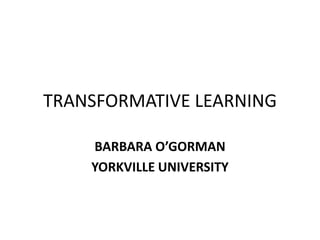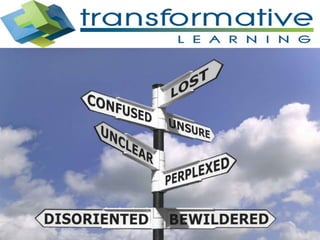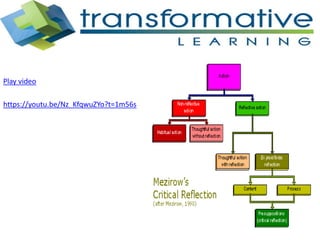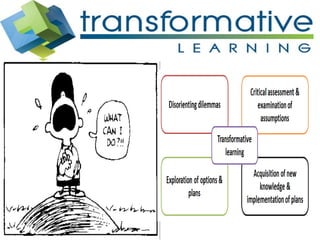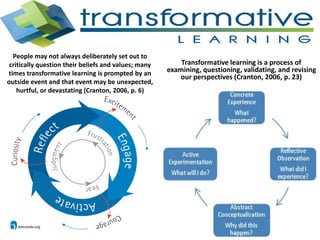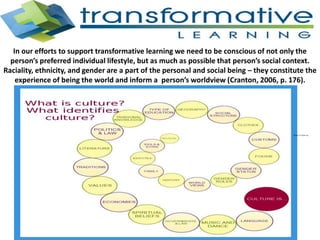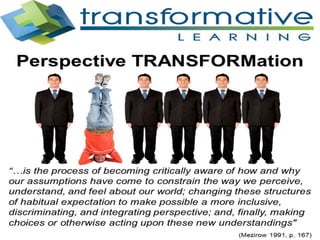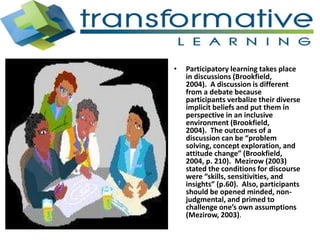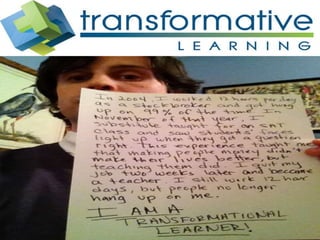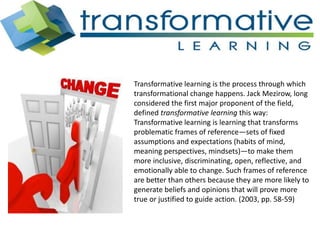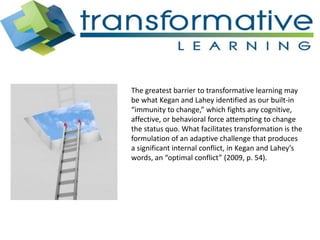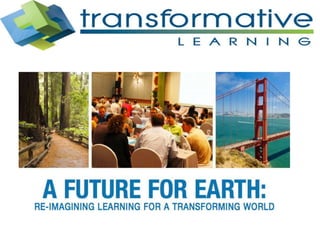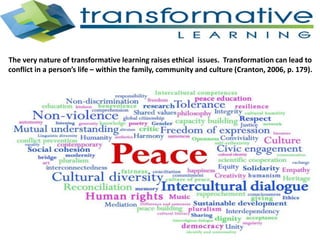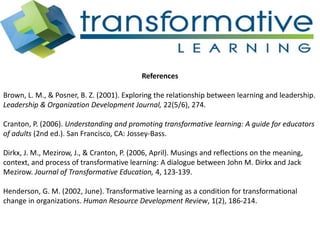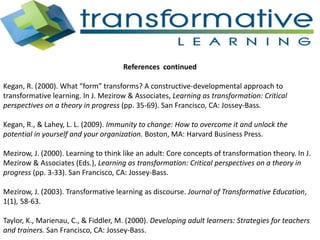Transformative Learning
- 1. TRANSFORMATIVE LEARNING BARBARA O’GORMAN YORKVILLE UNIVERSITY
- 4. Transformative learning involves experiencing a deep, structural shift in the basic premises of thought, feelings, and actions. It is a shift of consciousness that dramatically and permanently alters our way of being in the world. Such a shift involves our understanding of ourselves and our self-locations; our relationships with other humans and with the natural world; our understanding of relations of power in interlocking structures of class, race and gender; our body awarenesses; our visions of alternative approaches to living; and our sense of possibilities for social justice and peace and personal joy.
- 7. People may not always deliberately set out to critically question their beliefs and values; many times transformative learning is prompted by an outside event and that event may be unexpected, hurtful, or devastating (Cranton, 2006, p. 6) Transformative learning is a process of examining, questioning, validating, and revising our perspectives (Cranton, 2006, p. 23)
- 8. In our efforts to support transformative learning we need to be conscious of not only the person’s preferred individual lifestyle, but as much as possible that person’s social context. Raciality, ethnicity, and gender are a part of the personal and social being – they constitute the experience of being the world and inform a person’s worldview (Cranton, 2006, p. 176).
- 9. Supporting Transformative Learning requires a good understanding of individual differences in style, gender, psychological preferences, values, culture, race and gender (Cranton, 2006, p. 176).
- 11. In applying transformative learning to curriculum evaluation, one looks for evidence of critical reflection in terms of content, process and premise (Mezirow, 1991)
- 13. • Participatory learning takes place in discussions (Brookfield, 2004). A discussion is different from a debate because participants verbalize their diverse implicit beliefs and put them in perspective in an inclusive environment (Brookfield, 2004). The outcomes of a discussion can be “problem solving, concept exploration, and attitude change” (Brookfield, 2004, p. 210). Mezirow (2003) stated the conditions for discourse were “skills, sensitivities, and insights” (p.60). Also, participants should be opened minded, non- judgmental, and primed to challenge one’s own assumptions (Mezirow, 2003).
- 15. Transformative learning is the process through which transformational change happens. Jack Mezirow, long considered the first major proponent of the field, defined transformative learning this way: Transformative learning is learning that transforms problematic frames of reference—sets of fixed assumptions and expectations (habits of mind, meaning perspectives, mindsets)—to make them more inclusive, discriminating, open, reflective, and emotionally able to change. Such frames of reference are better than others because they are more likely to generate beliefs and opinions that will prove more true or justified to guide action. (2003, pp. 58-59)
- 16. According to Cranton, learning occurs when “an individual encounters an alternative perspective and prior habits of mind are called into question”; and it occurs as a dramatic event or a “gradual cumulative process” (2006, p. 23). For Mezirow, transformative learning “may be epochal, a sudden, dramatic, reorienting insight, or incremental, involving a progressive series of transformations in related points of view that culminate in a transformation in habit of mind” (2000, p. 21). Dirkx proposed that transformative learning can be as much a process of everyday occurrences as a “burning bush” phenomenon (2006, p. 132).
- 17. The greatest barrier to transformative learning may be what Kegan and Lahey identified as our built-in “immunity to change,” which fights any cognitive, affective, or behavioral force attempting to change the status quo. What facilitates transformation is the formulation of an adaptive challenge that produces a significant internal conflict, in Kegan and Lahey’s words, an “optimal conflict” (2009, p. 54).
- 21. The very nature of transformative learning raises ethical issues. Transformation can lead to conflict in a person’s life – within the family, community and culture (Cranton, 2006, p. 179).
- 22. Jung describes the analytic process as including awareness of personal unconscious contents such as dormant character traits, attitudes, and abilities followed by discovering your role as a social being – your place in the world where you fit according to your talents and abilities, your vocation. Then in the stage of transformation, you become more fully the person you were always meant to be (Cranton, 2006, p. 197).
- 23. Vision of Transformative Learning "Changes (1999 Remastered Version)" by David Bowie https://youtu.be/OwuYfuJA83c
- 24. References Brown, L. M., & Posner, B. Z. (2001). Exploring the relationship between learning and leadership. Leadership & Organization Development Journal, 22(5/6), 274. Cranton, P. (2006). Understanding and promoting transformative learning: A guide for educators of adults (2nd ed.). San Francisco, CA: Jossey-Bass. Dirkx, J. M., Mezirow, J., & Cranton, P. (2006, April). Musings and reflections on the meaning, context, and process of transformative learning: A dialogue between John M. Dirkx and Jack Mezirow. Journal of Transformative Education, 4, 123-139. Henderson, G. M. (2002, June). Transformative learning as a condition for transformational change in organizations. Human Resource Development Review, 1(2), 186-214.
- 25. References continued Kegan, R. (2000). What “form” transforms? A constructive-developmental approach to transformative learning. In J. Mezirow & Associates, Learning as transformation: Critical perspectives on a theory in progress (pp. 35-69). San Francisco, CA: Jossey-Bass. Kegan, R., & Lahey, L. L. (2009). Immunity to change: How to overcome it and unlock the potential in yourself and your organization. Boston, MA: Harvard Business Press. Mezirow, J. (2000). Learning to think like an adult: Core concepts of transformation theory. In J. Mezirow & Associates (Eds.), Learning as transformation: Critical perspectives on a theory in progress (pp. 3-33). San Francisco, CA: Jossey-Bass. Mezirow, J. (2003). Transformative learning as discourse. Journal of Transformative Education, 1(1), 58-63. Taylor, K., Marienau, C., & Fiddler, M. (2000). Developing adult learners: Strategies for teachers and trainers. San Francisco, CA: Jossey-Bass.

